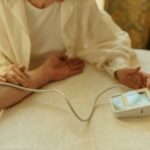Palpitations, faintness and shortness of breath are the signs of a possible heart arrhythmia.
An arrhythmia happens when the electrical signals regulating your heartbeat, malfunction. These malfunctions can cause irregularities or unusual rhythms in a heartbeat that should be stable. Arrhythmias can begin at any age, although they are more commonly found in older people. If you’re overweight, or drink in excess, your chances of developing an arrhythmia are increased.
What causes heart arrhythmias?
All arrhythmias are caused by two types of malfunction:
- Your heart has a natural pacemaker, and if this fails or is overcome by non-pacemaker cells, then an arrhythmia can occur
- Problems with conduction, caused by a blockage in your electrical pulses, or by an electrical signal that loops back to cause a second pulse (re-entry)
There are many different factors that might cause a heart arrhythmia, including:
- Coronary artery disease
- Imbalances in electrolytes, such as sodium and potassium
- Changes in your heart muscle, often brought about by cardiomyopathy, which can be caused by ageing, high blood pressure, diabetes, and thyroid disease
- Injury to your heart due to heart attack
- The healing process after heart surgery
Arrhythmias can also occur in perfectly normal and healthy hearts.
What are the different types of arrhythmia?
There are four main types of arrhythmia:
- Premature ventricular contractions are skipped heartbeats that everyone can occasionally experience, often related to excesses in stress, caffeine, nicotine, or exercise
- Atrial fibrillation, causes the heart to beat irregularly and faster than normal
- Supraventricular tachycardia, causing your heart to race when you’re otherwise calm and at rest
- Bradycardia, where your heart beats more slowly than is normal
- Heart block, where your heart beats slowly, sometimes causing you to collapse
If you would like to learn more about heart disease; the history, causes, and the various treatments, see Heart Disease: A Deeper Dive
Can an arrhythmia be diagnosed?
If you experience palpitations, faintness and shortness of breath on an ongoing basis, and if you have a history of heart problems or sudden death in your family it’s important that you speak to your GP about referring you to a heart specialist.
Arrhythmias can be diagnosed by a series of tests designed to track the electrical signals controlling your heart:
- Electrocardiogram (ECG), a simple test of your heart rhythm
- 24 hour ECG, a prolonged test of your heart rhythm, which involves you going about your usual daily activities while wearing a holter monitor
- An Exercise ECG, measuring the rhythm of your heart while you’re using a treadmill or exercise bike
- A cardiac event recorder, recording symptoms over a longer period of time, as and when you have them
- An electrophysiological (EP) study, involving passing soft wires up a vein in your leg and into your heart; it sounds gruesome but you’d be fully sedated
- An echocardiogram (echo), which is an ultrasound scan of your heart
You should always keep a copy of these test results for future use.
Can arrhythmias be treated?
As you might imagine, treatment for arrhythmia will depend on the type of arrhythmia that you have. Treatments include:
- Medication, which stops, prevents or controls your arrhythmia
- Cardioversion, involving electrical shocks that reset the rhythm of your heart while you are sedated
- Catheter ablation; a keyhole surgery that destroys the tissue causing your arrhythmia
- A pacemaker, which is a small battery device implanted in your chest that produces the electrical signals causing your heart to beat at a normal rate
- An ICD, which is almost like a pacemaker, but it monitors your heart rhythm and shocks your heart back to normality when necessary
As heart arrhythmias are more common in older people, it’s important that you keep an eye on your parents or elderly loved ones. It’s easy for those in their senior years to write symptoms off as part of the ageing process, but lack of treatment could seriously impact on their life expectancy.
If you’re unable to give your elderly loved ones as much attention as you would like to, you might consider opting for a home carer. Carers can provide support to your loved ones in their own home, from just a few hours a week to full time, and they can provide you with valuable insight and peace of mind.





